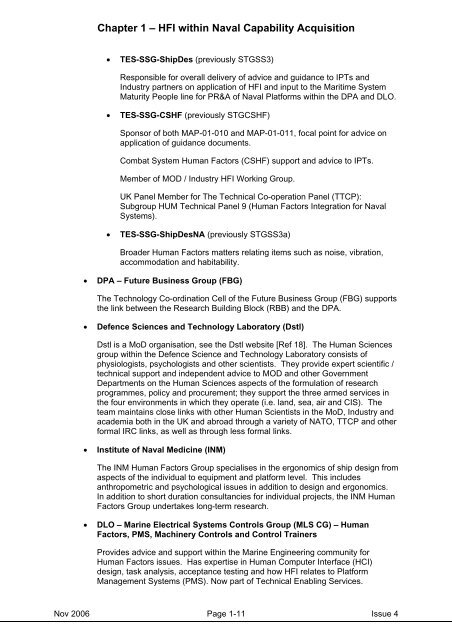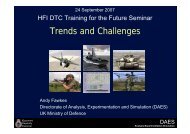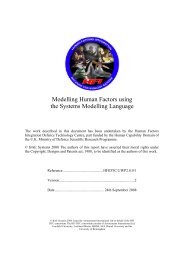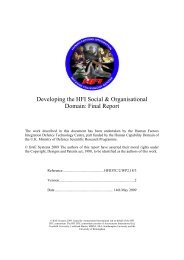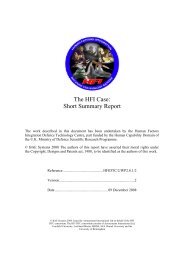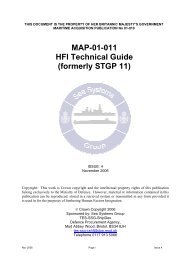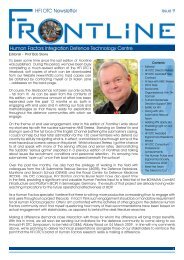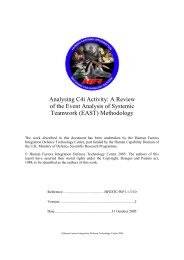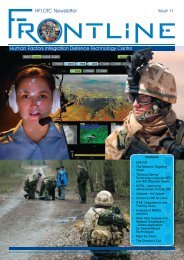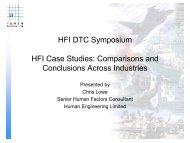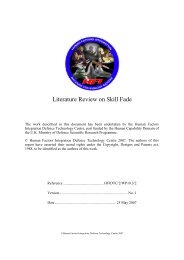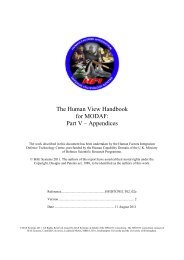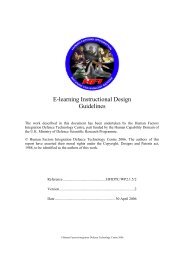MAP-01-010 HFI Management Guide - Human Factors Integration ...
MAP-01-010 HFI Management Guide - Human Factors Integration ...
MAP-01-010 HFI Management Guide - Human Factors Integration ...
Create successful ePaper yourself
Turn your PDF publications into a flip-book with our unique Google optimized e-Paper software.
Chapter 1 – <strong>HFI</strong> within Naval Capability Acquisition<br />
• TES-SSG-ShipDes (previously STGSS3)<br />
Responsible for overall delivery of advice and guidance to IPTs and<br />
Industry partners on application of <strong>HFI</strong> and input to the Maritime System<br />
Maturity People line for PR&A of Naval Platforms within the DPA and DLO.<br />
• TES-SSG-CSHF (previously STGCSHF)<br />
Sponsor of both <strong>MAP</strong>-<strong>01</strong>-<strong>01</strong>0 and <strong>MAP</strong>-<strong>01</strong>-<strong>01</strong>1, focal point for advice on<br />
application of guidance documents.<br />
Combat System <strong>Human</strong> <strong>Factors</strong> (CSHF) support and advice to IPTs.<br />
Member of MOD / Industry <strong>HFI</strong> Working Group.<br />
UK Panel Member for The Technical Co-operation Panel (TTCP):<br />
Subgroup HUM Technical Panel 9 (<strong>Human</strong> <strong>Factors</strong> <strong>Integration</strong> for Naval<br />
Systems).<br />
• TES-SSG-ShipDesNA (previously STGSS3a)<br />
Broader <strong>Human</strong> <strong>Factors</strong> matters relating items such as noise, vibration,<br />
accommodation and habitability.<br />
• DPA – Future Business Group (FBG)<br />
The Technology Co-ordination Cell of the Future Business Group (FBG) supports<br />
the link between the Research Building Block (RBB) and the DPA.<br />
• Defence Sciences and Technology Laboratory (Dstl)<br />
Dstl is a MoD organisation, see the Dstl website [Ref 18]. The <strong>Human</strong> Sciences<br />
group within the Defence Science and Technology Laboratory consists of<br />
physiologists, psychologists and other scientists. They provide expert scientific /<br />
technical support and independent advice to MOD and other Government<br />
Departments on the <strong>Human</strong> Sciences aspects of the formulation of research<br />
programmes, policy and procurement; they support the three armed services in<br />
the four environments in which they operate (i.e. land, sea, air and CIS). The<br />
team maintains close links with other <strong>Human</strong> Scientists in the MoD, Industry and<br />
academia both in the UK and abroad through a variety of NATO, TTCP and other<br />
formal IRC links, as well as through less formal links.<br />
• Institute of Naval Medicine (INM)<br />
The INM <strong>Human</strong> <strong>Factors</strong> Group specialises in the ergonomics of ship design from<br />
aspects of the individual to equipment and platform level. This includes<br />
anthropometric and psychological issues in addition to design and ergonomics.<br />
In addition to short duration consultancies for individual projects, the INM <strong>Human</strong><br />
<strong>Factors</strong> Group undertakes long-term research.<br />
• DLO – Marine Electrical Systems Controls Group (MLS CG) – <strong>Human</strong><br />
<strong>Factors</strong>, PMS, Machinery Controls and Control Trainers<br />
Provides advice and support within the Marine Engineering community for<br />
<strong>Human</strong> <strong>Factors</strong> issues. Has expertise in <strong>Human</strong> Computer Interface (HCI)<br />
design, task analysis, acceptance testing and how <strong>HFI</strong> relates to Platform<br />
<strong>Management</strong> Systems (PMS). Now part of Technical Enabling Services.<br />
Nov 2006 Page 1-11 Issue 4


